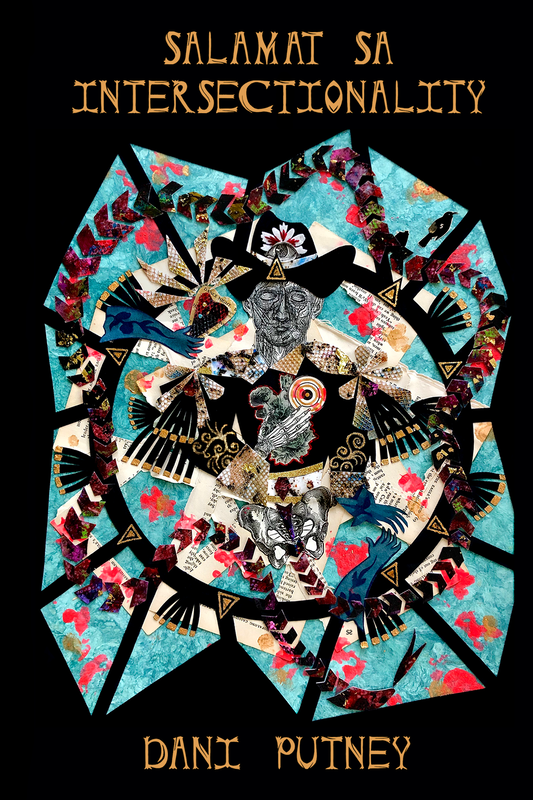|
The Breadcrumbs widget will appear here on the published site.
By Alex Carrigan A person's identity is built up of many pieces that are constantly polished, sharpened, and reformed as the structure is formed. Many factors can influence one's development, whether it's their gender, sexuality, heritage, personal history, and more. To understand how one came to be, and how all of this can inform one's art, it takes a deep dive into the psyche and the past to truly understand one's self. In Dani Putney's forthcoming debut, they attempt to trace their evolution as a queer, non-binary, mixed-race Filipinx, and neurodivergent individual through the triptych Salamat sa Intersectionality. The poems are divided into three sections, each tackling a particular period of Putney's life as they come to understand their self. The poems range from recollecting particular memories of their past to more abstract ruminations on the author's part. In the first section, "Youthful Absolution," Putney writes about various anecdotes from their childhood and adolescence. Many of the poems speak about their parents and their early sexual development, all while using the backdrop of the American West to aid in the setting and atmosphere. Some poems, like "Sanctuary" and "Gates of Paradise" discuss the issues Putney had growing up with a religious, conservative upbringing, while others like "Pearls" and "Father's Estate" discuss figures who impacted their sexuality, whether they were Colin Firth in Mamma Mia! or an unnamed man in a photograph they found in their father's belongings. Many of the pieces in this section are also characterized by the desert heat and western natural settings like thick brambles and caverns. The second section, "Salted Pores," follows Putney's exploration of their sexuality. This section focuses more on microcosms of Putney's past, where it's small details and moments they focus on instead of whole memories. The poems in this section continue many of the imagery and tonal elements of the past section, where the desert setting adds to the sexual imagery in poems like "Snails" which open with "Outside / lips were earthy / like his desert origins, / each chapped sliver of skin / a horseback ride / through sagebrush." The poems in this section are more charged, but in doing so play with images of traditional masculinity and queer sexual exploration. Images like cattlemen, biker bars, and blue collar workers are mixed in with flirtatious lines and actions, where the men in these poems listen to AC/DC but also have intercourse in public restrooms. The final section, "Taken Root," is the coalescence of Putney's journey, while also the reflection on their wider influences and aspects of their identity. The first few poems speak of various figures who influenced them, such as Sylvia Plath, Virginia Woolf, Scar from The Lion King, and more. Later, poems, like "OCD" and "PDX Queen" deal with direct aspects they identify with and how others view them. The former poem takes the imaged of a shared desk lamp to show how it can trigger certain actions, while the latter deals with how others see them, with lines like "If I say I'm a poet / I become a relic. / If I say I'm trans / my body becomes ars poetica." It's also in this section that a lot of the imagery from past sections transforms into descriptions of the desert as post-apocalypse. While it begins with Putney describing themselves in the video game Borderlands, it later turns into poems like "150 Years of Molt" and "Post-apocalyptic" that describe the eventual decay of the world around them. But it's also towards the end that the poems begin to reach an inner peace, such as the titular poem which reads "I'm not growing into a Man / under indigo sky, on saffron fields. / My swamp hemolyph perspires through Cebuano skin: / thick and brown, pliable and brown." Even the final poem has a connection to the very first poem in the connection, showing how the collection has come full circle in Putney's search for their identity. Salamat sa Intersectionality is a fantastic debut of a poet who takes all the pieces of their self and shows how much detail and work goes into each individual part. It's a book that offers a lot for those interested in poetry by BIPOC, LGBTQIAP+, and neurodivergent authors, and the intersectionality allows for a great intermingling. Putney's at times quite a daring author, but also an incredibly relatable one, and this collection offers a wonderful mission statement as to who they are and what kind of art they can create.
0 Comments
CommentsYour comment will be posted after it is approved.
Leave a Reply. |
AuthorWrite something about yourself. No need to be fancy, just an overview. Archives
March 2024
Categories
All
|



 RSS Feed
RSS Feed






